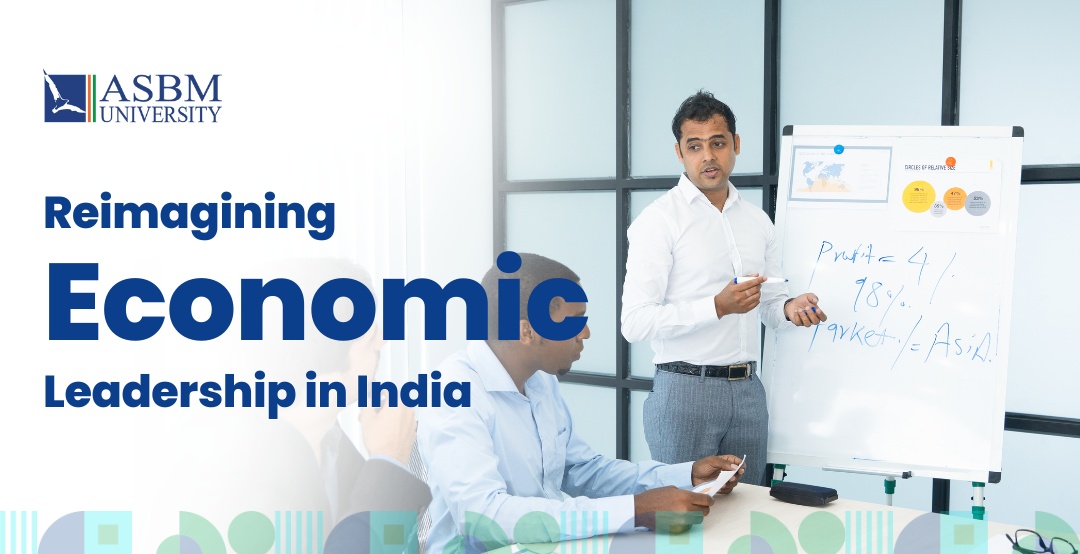Reimagining Economic Leadership in India’s Rapidly Evolving Technological Landscape

India’s economy has demonstrated remarkable resilience, emerging from the depths of the Covid-19 pandemic to reclaim its position as one of the fastest-growing major economies globally. As the nation navigates through 2024, a complex interplay of factors shapes the economic landscape, presenting both opportunities and obstacles on the path to sustained growth.
At the forefront of India’s economic resurgence is the robust growth in Gross Domestic Product (GDP). Projections for the fiscal year 2023-24 suggest a GDP growth rate ranging from 6.5% to 7%, a commendable achievement considering the pandemic-induced setbacks. This growth has been primarily fuelled by the services sector, which accounts for over 50% of the nation’s GDP and has displayed remarkable resilience, buoyed by domestic consumption.
India wasn’t always a powerhouse in technology. Once, our economy relied heavily on agriculture. But things have changed. We’ve steadily transformed into a service-driven economy, with the information technology (IT) sector leading the charge. Think of IT as the spearhead of this change, pushing us forward.
However, this is just the beginning. Even bigger disruptions are on the horizon. New technologies like artificial intelligence (AI), machine learning, and the Internet of Things (IoT) are emerging, ushering in a whole new era. These technologies are so powerful, they could make our current economic wisdom seem like advice from a bygone age.
The Impact of Technology
Technology’s influence on India’s economic growth is undeniable. It’s like a double-edged sword. On one hand, digital technologies have created a thriving ecosystem of e-commerce, financial technology (FinTech), and other tech-driven industries. These advancements have opened up exciting new opportunities for jobs and entrepreneurship. Imagine a vast marketplace where you can buy and sell anything online, or a system that lets you manage your money with just your phone. These are just a few examples of the possibilities.
But there’s a flip side to this coin. Automation, powered by technology, is a looming threat. Just like a machine can replace a factory worker, some traditional jobs might disappear. This means we need to prepare our workforce for the future by teaching them new skills – a process called reskilling and up-skilling.
The Current State of Job Market
The way we work in India is changing dramatically. It’s like a massive earthquake shaking up the job market. Those who can’t adapt will be left behind. As automation takes over more and more traditional jobs, new opportunities are emerging in fields like e-commerce, digital marketing, data analysis, and cyber security. These new jobs require a completely different skillset – not just technical knowledge, but also the ability to think critically, solve problems creatively, and be incredibly adaptable.
The leaders of tomorrow will need to be experts in cutting-edge technologies like AI and cloud computing. Imagine a leader who can see the future and navigate uncharted territory with confidence. These are the kinds of leaders we need to succeed in this new technological age.
A New Breed of Leader Required
Effective leadership in this era of rapid technological change is a demanding task. It requires individuals who are not afraid of innovation, who can create a work environment that encourages continuous learning, and who have the courage to take calculated risks. These leaders need to be flexible, visionary, and willing to challenge old ideas to stay ahead of the curve.
However, the challenges they face are immense. Managing the disruptions caused by technology, navigating complex regulations, and dealing with the ethical considerations of new technologies all require a holistic approach. Leaders need to balance innovation with ethical responsibility, sustainability, and social good.
Education as the Catalyst
In the quest to cultivate techno-economic leaders capable of navigating the digital landscape, investing in advanced education and specialised training programmes becomes paramount. Equipping economic policymakers and aspiring leaders with cutting-edge knowledge and skills through advanced degrees can prove invaluable in driving the digital transformation of India’s economy.
Advanced degrees, such as specialised master’s programmes and doctoral studies like MBA, MA Economics, and Ph.D. programmes, offer a unique opportunity to delve deep into the convergence of economics, technology, and data science. These interdisciplinary programmes provide a comprehensive understanding of theoretical frameworks, quantitative methods, and cutting-edge research, enabling individuals to tackle complex economic challenges through a techno-economic lens.
MBA Programmes: A Nexus of Business, Technology, and Economics
Master of Business Administration (MBA) programmes, particularly those with concentrations in areas like technology management, business analytics, and digital transformation, provide a comprehensive understanding of the interplay between business strategies, technological advancements, and economic principles. By combining core business fundamentals with specialised courses in data analysis, digital marketing, and emerging technologies, MBA graduates gain a multidisciplinary perspective essential for effective decision-making in the digital economy.
MA Economics: Harnessing Data-Driven Insights
Pursuing a Master of Arts (MA) in Economics, with a focus on quantitative methods, econometrics, and data analysis, equips individuals with the analytical tools and theoretical frameworks to navigate the complexities of a data-driven economic landscape. These programmes foster proficiency in statistical modelling, econometric techniques, and the application of advanced computational tools, enabling graduates to uncover insights from vast datasets and inform evidence-based policymaking.
ALSO READ: The Benefits of MA Economics Degree
Ph.D. Programmes: Pushing the Frontiers of Knowledge
Doctoral programmes in fields like Economics, Data Science, and Technology Management offer a unique opportunity for individuals to engage in cutting-edge research and contribute to the advancement of knowledge at the intersection of economics and technology. Through rigorous coursework, independent research, and collaborative projects, Ph.D. candidates develop a deep understanding of theoretical concepts, research methodologies, and the ability to tackle complex economic challenges through innovative, data-driven approaches.
Furthermore, at ASBM University, many of these programmes incorporate experiential learning components, such as internships, capstone projects, and industry collaborations, enabling individuals to apply their knowledge in real-world settings, develop hands-on skills in leveraging digital tools and data analysis techniques, and gain exposure to the latest technological advancements shaping various economic sectors.
Fostering Innovation and Collaboration
Policymakers can’t go it alone. Imagine a fertile garden – it needs not just good soil, but also sunshine, water, and careful tending. To cultivate a thriving ecosystem of innovation, collaboration is key. This means working together with:
- Universities and research institutions: Encouraging research partnerships between universities and businesses allows for ground-breaking discoveries and fosters a culture of innovation.
- Entrepreneurs and startups: Providing financial incentives, mentorship programmes, and simplified regulations can empower risk-takers to bring their ideas to life.
- Venture capitalists and investors: Creating a stable investment environment attracts capital crucial for funding innovative ventures.
Collaboration extends beyond our borders. Just like rivers flowing together create a mighty current, international partnerships can accelerate progress. Sharing knowledge and resources with other countries at the forefront of technology strengthens our collective position in the global marketplace.
The Future Belongs to the Learners
The ability to learn and adapt is paramount, as we are at the very centre of the drastic technological transformation. Leaders, policymakers, and individuals alike must embrace a mindset of lifelong learning. This means:
- Staying Curious: Actively seeking out new knowledge and keeping abreast of the latest technological advancements is crucial.
- Developing New Skills: Be prepared to invest time and resources in acquiring new skills that are relevant to the evolving job market.
- Embracing Change: Viewing change not as a threat, but as an opportunity for growth is essential for success in this dynamic environment.
India’s economic transformation presents both challenges and opportunities. By embracing technological change, fostering a culture of innovation and continuous learning, and working collaboratively, we can position ourselves as a global leader in the technological age. Imagine India as a beacon of progress, lighting the way for a brighter future. The journey ahead requires dedication, adaptability, and a willingness to learn. But with the right approach, India can unlock its true potential and become a trailblazer in the exciting world of tomorrow.



